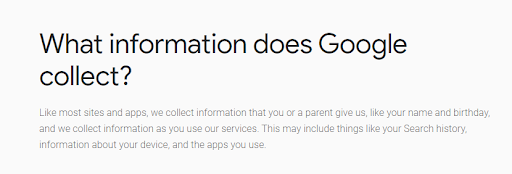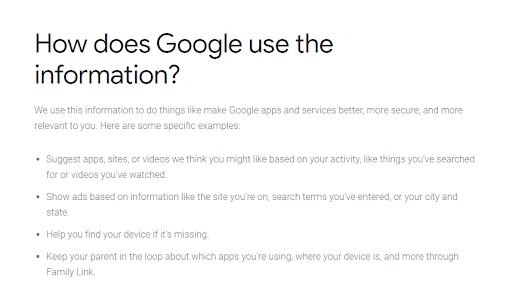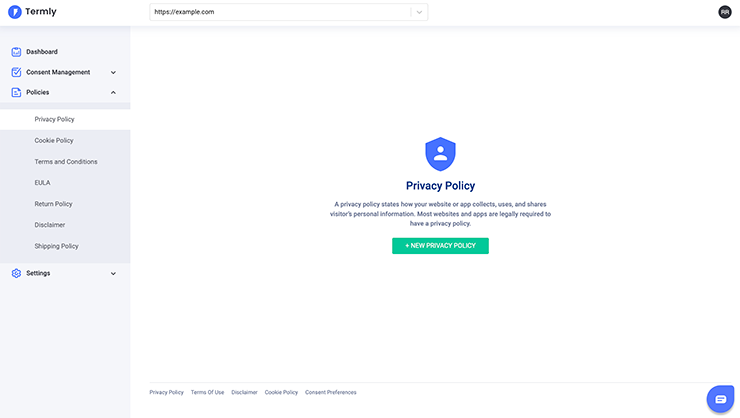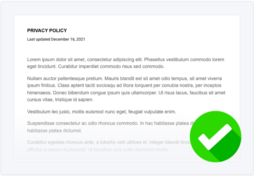When creating legal policies for your business, avoid legalese. Legalese is a form of writing that makes your policies unnecessarily complicated.
If users have trouble understanding your policies because there’s too much of this formal language, it could have consequences for your business.
This article will go over the meaning of legalese, reasons to avoid it, and best practices for writing your legal policies.
1. Legalese Meaning
Legalese is a technical form of writing often used by lawyers and members of the legal community to discuss legal definitions, terms, laws, and contracts.
It’s also known as:
- legal jargon
- legal speak
- legal English
- gobbledegook
- officialese
Businesses use this type of language with the hope that it will make their policies more legally sound and professional. It’s also used because many companies use templates that include legalese. However, you should avoid using too much of it because few people are familiar with such complicated jargon.
When you use legal jargon, people may not understand the points you’re trying to make. They may end up misinterpreting the rights and responsibilities assigned to them by your policy. Customers don’t want to call their lawyers to understand a policy on your website before they buy something from you.
As such, being too reliant on complicated legal words will likely harm your clients and by extension, your business.
2. Legalese Examples
The following sentences are legalese examples:
In witness whereof, the parties hereunto have set their hands to these presents as a deed on the day month and year hereinbefore mentioned.
Translated from legal speak to plain English, this sentence simply refers to the “Date” line that often follows a signature.
Here’s another example found in a sample limitation of liabilities clause:
IN NO EVENT SHALL COMPANY OR ITS DIRECTORS, EMPLOYEES, OR AGENTS BE LIABLE TO YOU OR ANY THIRD PARTY FOR ANY DIRECT, INDIRECT, CONSEQUENTIAL, EXEMPLARY, INCIDENTAL, SPECIAL, OR PUNITIVE DAMAGES, INCLUDING LOST PROFIT, LOST REVENUE, LOSS OF DATA, OR OTHER DAMAGES ARISING FROM YOUR USE OF THE WEBSITE OR COMPANY SERVICES, EVEN IF COMPANY HAS BEEN ADVISED OF THE POSSIBILITY OF SUCH DAMAGES.
In simple terms, this clause states that the company and its employees will not be liable for any direct or indirect damages arising from using the site or company services, including financial losses or losses of data.
The above legalese examples show it’s possible to replace the complicated legal language in your policies with plain language that anyone can understand.
3. Why Is Legalese Bad?
Legalese is bad because it can confuse your users or hide important messages in difficult-to-read language. It can also mislead your users or prevent them from learning more about your policies due to frustration with how you’re presenting your ideas.
Legal language is often associated with the infamous “fine print,” where important information is buried in complicated, dense sentences.
Legal speak may cause users to suspect there are hidden clauses or terms in your policies, making them less likely to trust your business.
Furthermore, overly complicated language makes users feel alienated, as most people outside of the legal profession aren’t well-versed in legal jargon.
4. Why Using Legalese Could Hurt Your Business
Establishing trust and transparency with users is crucial to your business, and part of that trust comes from users understanding and respecting your legal policies.
Legalese makes your policies more difficult to understand, which could make them less legally effective and end up putting your business at a disadvantage with customers.
Here are three major reasons why you should avoid legalese when crafting your legal and business policies.
1. Legalese negatively affects customer relationships
If customers see overly formal legal language in your business policies, they may feel confused, offended, or suspicious. All of these feelings make customers less inclined to make a purchase or sign up for a membership.
On the other hand, clear and plain language allows customers without legal know-how to feel at ease with your business rather than feeling taken advantage of or manipulated.
Don’t copy terms and conditions or other policies from your competitors, as they may be riddled with legalese.
Put yourself in your user’s shoes. Think back to before you started your company and what you would do if you encountered such complex language when browsing your favorite site. Would you understand what’s going on? Would you find the language confusing and misleading? Would you leave the site for another that uses clearer, more reliable language in its policies?
Probably.
That’s why you should just keep things as straightforward as possible by using clear, plain language. Make sure your users can understand any possible consequences and outcomes from using your services, and ensure they know what rights they have under your policies. That helps them make informed decisions and builds trust for your business.
2. Users may not understand or follow your terms
Your policies are for your protection, too. For example, terms and conditions help protect your website’s rights and establish how users can interact with your properties. If your terms and conditions are full of legalese, your users won’t understand them, and they won’t be able to follow your rules.
For ecommerce businesses, overly complicated shipping or refund policies may drive potential customers away. They may also result in more customer complaints due to confusion about your terms.
3. Legalese could have legal consequences
In addition to being bad for your business, there are laws around the world that explicitly prohibit the use of complicated legal language in legal policies.
For instance, the European Union’s General Data Protection Regulation (GDPR) requires businesses to use clear and plain language in their GDPR privacy policies. This means you legally can’t write your cookie policy or privacy policy using a lot of legal English. Everyone, including children if your website targets or has a section for them, needs to be able to understand what you’re going to do with their personal data and what rights they have to protect their personal information.
As an example, Google Family Link’s child-friendly privacy policy uses big headings, short sentences, and an accessible, friendly tone to facilitate understanding.


Notice how Google also uses bullet points to break complicated issues down. Shorter bullet points are clearer and easier to understand.
Similarly, Canada’s Personal Information Protection and Electronic Documents Act (PIPEDA) requires organizations to be open about their data handling practices to the public. That means all privacy policies need to be clear and legalese-free.
Not following these regulations can lead to reputational damage as well as legal consequences.\
5. Replace Legalese With Plain Language
You can still craft legally sound policies without using legalese. Here are some tips to follow when writing your policies.
1. Be clear
First and foremost, write your policies using clear and plain language. Avoid long, complicated sentences, and replace legal terms with simpler words whenever possible. To boost your policy’s readability, you should also get rid of the following:
- Noun strings
- Unnecessary words
- Split infinitives
- Passive voice (unless absolutely necessary)
- Separated verb parts
- Negative compounds (e.g. “Uber does not share…unless…” can be replaced with “Uber only shares…if…”)
Break down complex business or legal processes into step-by-step lists, use bullet points as needed, and define any uncommon terms. Add graphics and pictures if they will help your users stay engaged and understand your points better.
You should also consider using a lively tone to sound more approachable and less intimidating to your users. This helps keep your readers engaged even if your policy needs to be written in very formal language, which is necessary for some industries and niches.
2. Emphasize key information
To gain your users’ trust, you need to draw their attention to clauses that may be contentious or a source of legal dispute, such as a no-warranty statement or limitation of liabilities clause. Otherwise, your policy may not feel sincere or credible. You can highlight important policy sections or disclaimers by:
- capitalizing
- bolding
- italicizing
- underlining
- coloring
3. Be transparent
Be as transparent as possible in your legal policies by being comprehensive and not hiding any important information from users.
Transparency and clarity in your policies can help prevent any potential lawsuits on the basis of perceived word manipulation. Clearly outline how you process user data in your privacy policy, and explicitly state your guidelines for refunds in your return policy.
An important part of transparency is disclosing your website’s endorsements. If you have an affiliate disclosure, make sure it’s written and displayed clearly per FTC guidelines.
These tips don’t detract from the fact that legal policies still need to be legally binding and comprehensive. However, ensuring that customers fully understand the policies on your site benefits your business greatly.
![]()
Try Termly for Free!
Termly is a an easy-to-use solution for data privacy compliance and consent management.

We know that keeping up with complex data privacy laws can be confusing and time-consuming; that’s why we do the hard work for you!
Try our legal policy generators and cookie consent management solutions for FREE!


